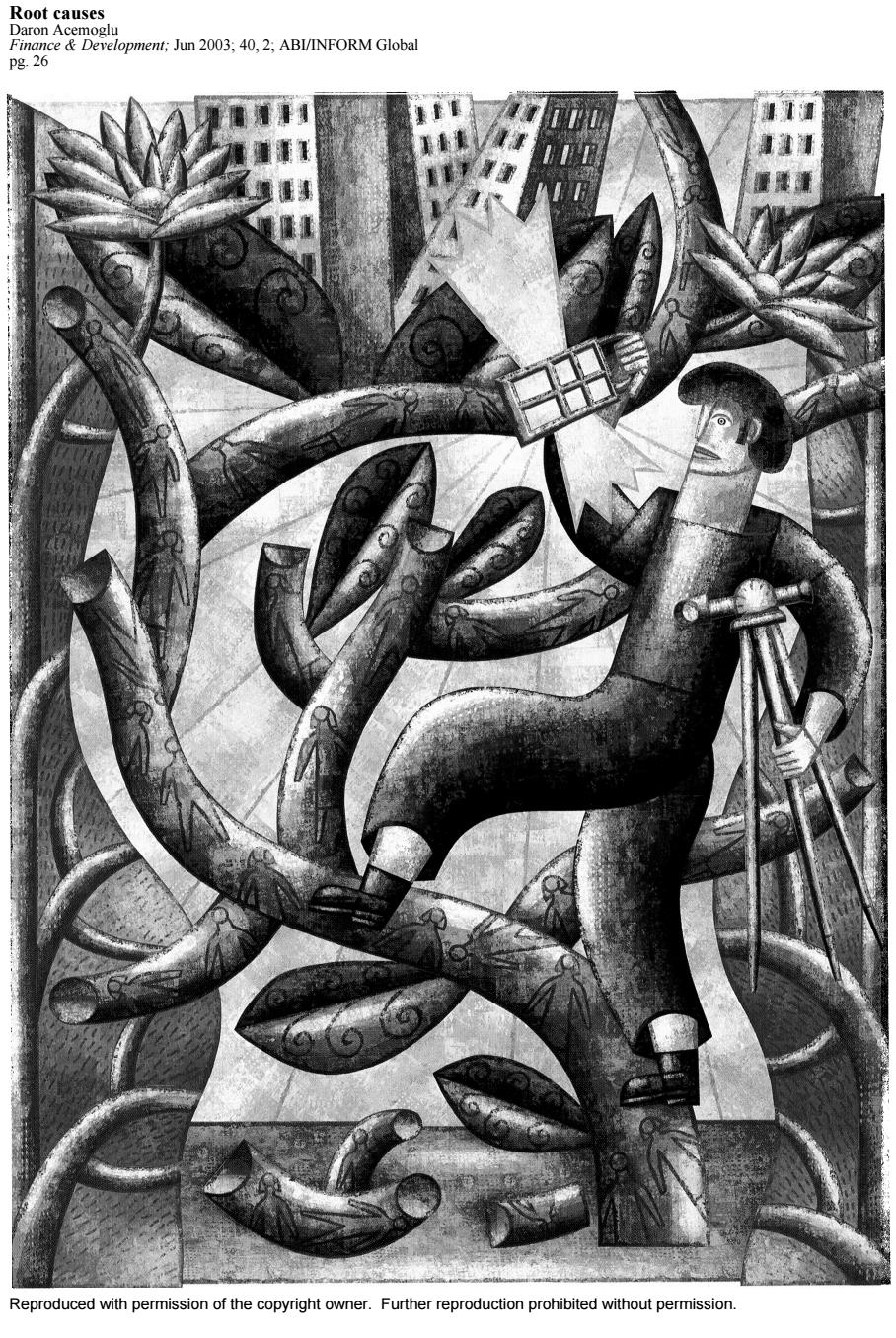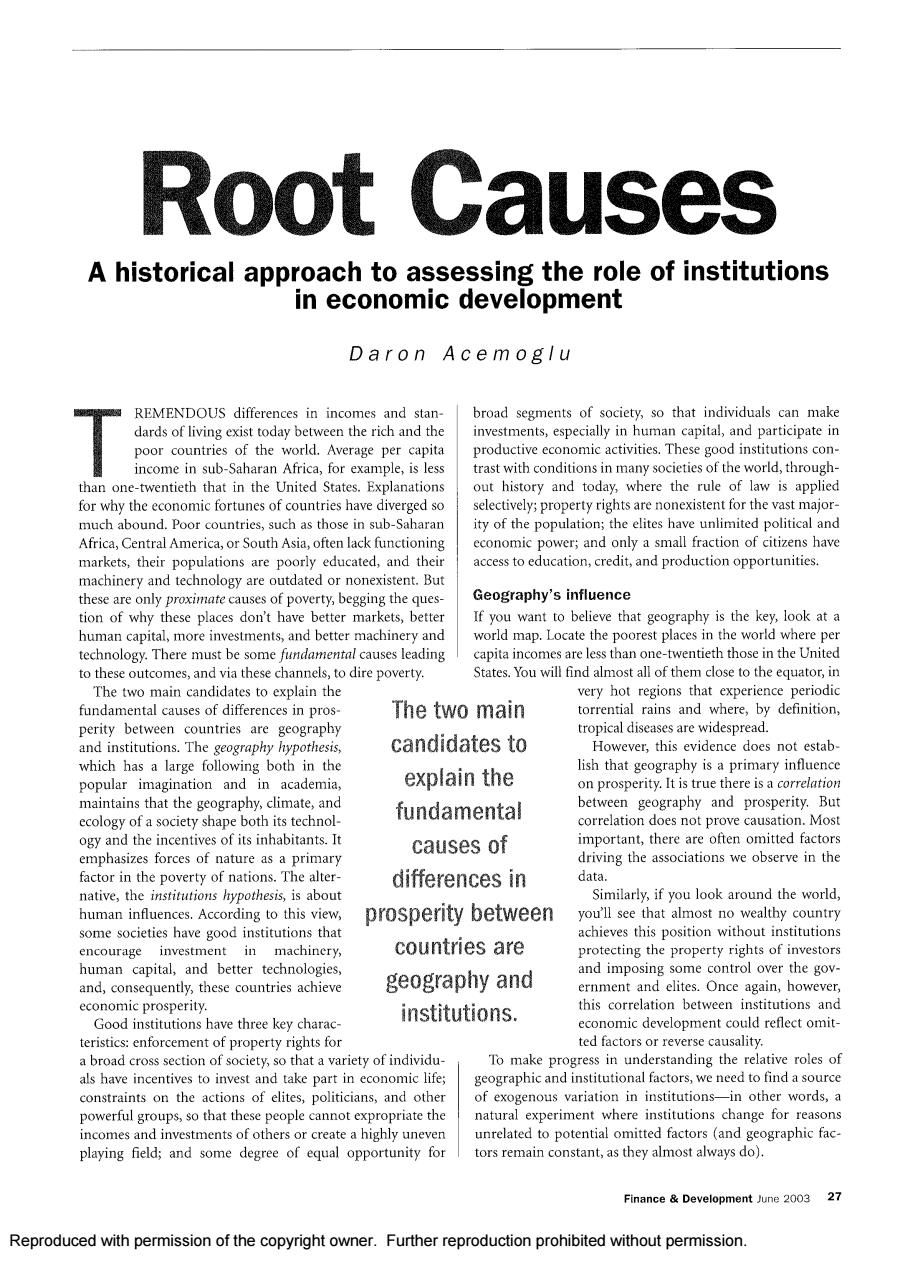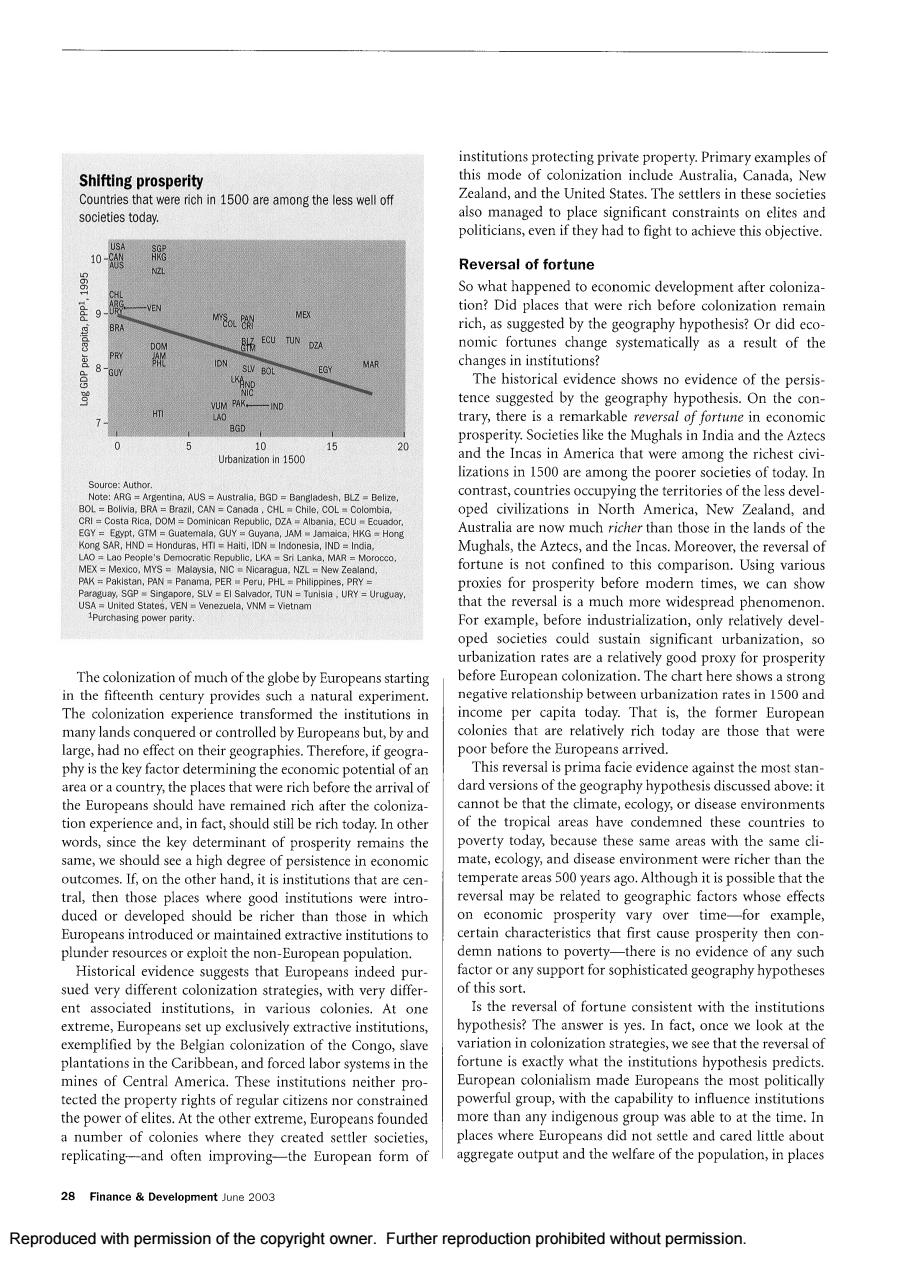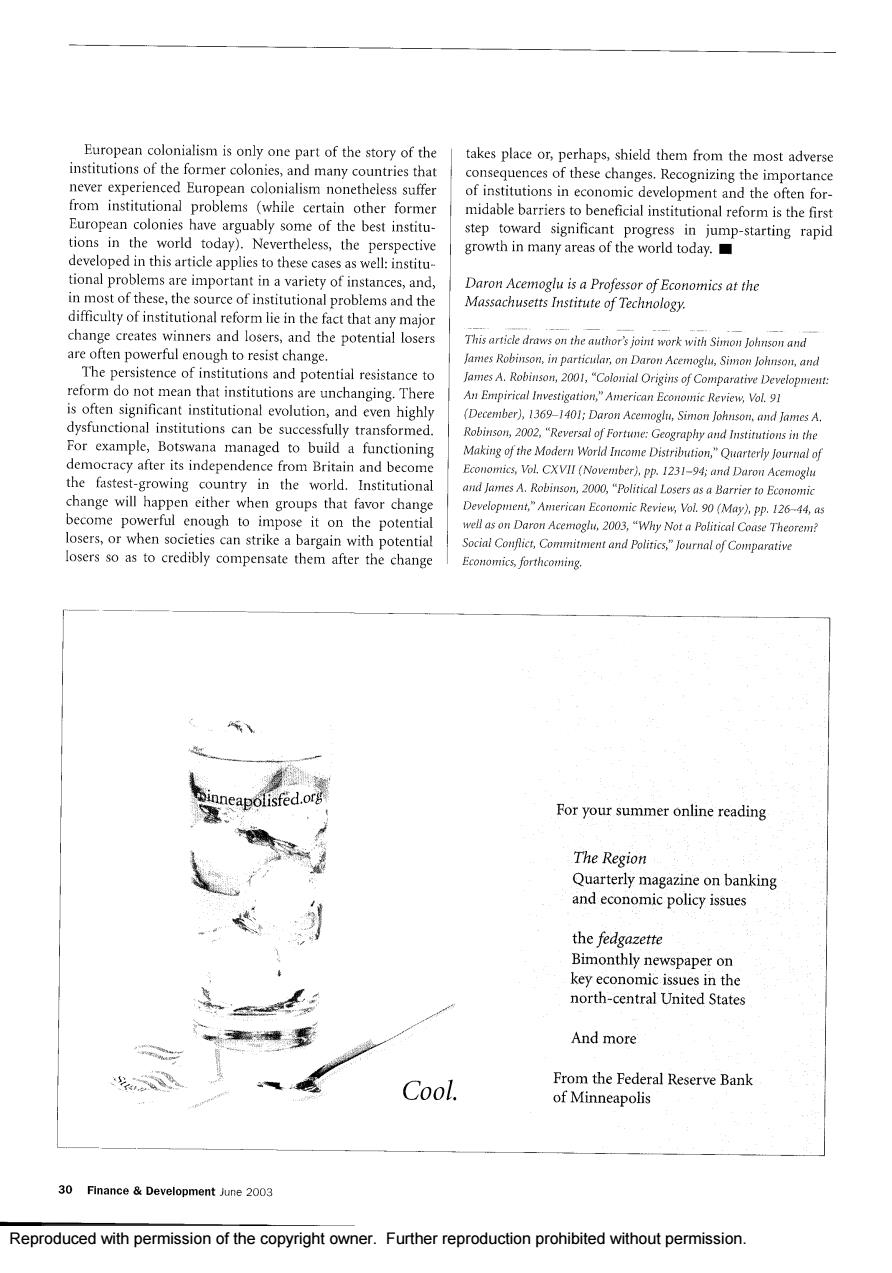
Root causes Daron Acemoglu Finance Development:Jun 2003:40,2:ABI/INFORM Global pg.26 Reproduced with permission of the copyright owner.Further reproduction prohibited without permission
Reproduced with permission of the copyright owner. Further reproduction prohibited without permission. Root causes Daron Acemoglu Finance & Development; Jun 2003; 40, 2; ABI/INFORM Global pg. 26

Root causes A historical approach to assessing the role of institutions in economic development D ar o n A c e m o g l u REMENDOUS differences in incomes and stan- broad segments of society,so that individuals can make dards of living exist today between the rich and the investments,especially in human capital,and participate in poor countries of the world.Average per capita productive economic activities.These good institutions con- income in sub-Saharan Africa,for example,is less trast with conditions in many societies of the world,through- than one-twentieth that in the United States.Explanations out history and today,where the rule of law is applied for why the economic fortunes of countries have diverged so selectively;property rights are nonexistent for the vast major- much abound.Poor countries,such as those in sub-Saharan ity of the population;the elites have unlimited political and Africa,Central America,or South Asia,often lack functioning economic power;and only a small fraction of citizens have markets,their populations are poorly educated,and their access to education,credit,and production opportunities. machinery and technology are outdated or nonexistent.But these are only proximate causes of poverty,begging the ques- Geography's influence tion of why these places don't have better markets,better If you want to believe that geography is the key,look at a human capital,more investments,and better machinery and world map.Locate the poorest places in the world where per technology.There must be some furdamental causes leading capita incomes are less than one-twentieth those in the United to these outcomes,and via these channels,to dire poverty. States.You will find almost all of them close to the equator,in The two main candidates to explain the very hot regions that experience periodic fundamental causes of differences in pros- The two main torrential rains and where,by definition, perity between countries are geography tropical diseases are widespread. and institutions.The geography hypothesis, candidates to However,this evidence does not estab- which has a large following both in the lish that geography is a primary influence popular imagination and in academia, explain the on prosperity.It is true there is a correlation maintains that the geography,climate,and between geography and prosperity.But ecology of a society shape both its technol- fundamental correlation does not prove causation.Most ogy and the incentives of its inhabitants.It causes of important,there are often omitted factors emphasizes forces of nature as a primary driving the associations we observe in the factor in the poverty of nations.The alter- differences in data. native,the institutions hypothesis,is about Similarly,if you look around the world, human influences.According to this view, prosperity between you'll see that almost no wealthy country some societies have good institutions that achieves this position without institutions encourage investment in machinery, countries are protecting the property rights of investors human capital,and better technologies, and imposing some control over the gov- and,consequently,these countries achieve geography and ernment and elites.Once again,however, economic prosperity. institutions this correlation between institutions and Good institutions have three key charac- economic development could reflect omit- teristics:enforcement of property rights for ted factors or reverse causality. a broad cross section of society,so that a variety of individu- To make progress in understanding the relative roles of als have incentives to invest and take part in economic life; geographic and institutional factors,we need to find a source constraints on the actions of elites,politicians,and other of exogenous variation in institutions-in other words,a powerful groups,so that these people cannot expropriate the natural experiment where institutions change for reasons incomes and investments of others or create a highly uneven unrelated to potential omitted factors(and geographic fac- playing field;and some degree of equal opportunity for tors remain constant,as they almost always do). Finance Development June 2003 27 Reproduced with permission of the copyright owner.Further reproduction prohibited without permission
Reproduced with permission of the copyright owner. Further reproduction prohibited without permission

institutions protecting private property.Primary examples of Shifting prosperity this mode of colonization include Australia,Canada,New Countries that were rich in 1500 are among the less well off Zealand,and the United States.The settlers in these societies societies today. also managed to place significant constraints on elites and politicians,even if they had to fight to achieve this objective. 0 Reversal of fortune So what happened to economic development after coloniza- 是9 L器 MEX tion?Did places that were rich before colonization remain BRA rich,as suggested by the geography hypothesis?Or did eco- DOM ECU TUN DZA nomic fortunes change systematically as a result of the PRY 8-GUY IDN SLV BOL EGY changes in institutions? The historical evidence shows no evidence of the persis- VUM PAK- IND tence suggested by the geography hypothesis.On the con- trary,there is a remarkable reversal of fortune in economic BGD prosperity.Societies like the Mughals in India and the Aztecs 10 15 20 Urbanization in 1500 and the Incas in America that were among the richest civi- lizations in 1500 are among the poorer societies of today.In Source:Author. Note:ARG=Argentina,AUS=Australia,BGD=Bangladesh,BLZ-Belize, contrast,countries occupying the territories of the less devel- BOL Bolivia,BRA Brazil,CAN Canada,CHL Chile,COL Colombia, oped civilizations in North America,New Zealand,and CRI Costa Rica,DOM Dominican Republic,DZA Albania,ECU Ecuador EGY=Egypt,GTM Guatemala,GUY Guyana,JAM Jamaica,HKG Hong Australia are now much richer than those in the lands of the Kong SAR,HND Honduras,HTI Haiti,IDN Indonesia,IND India, Mughals,the Aztecs,and the Incas.Moreover,the reversal of LAO Lao People's Democratic Republic,LKA Sri Lanka,MAR Morocco, MEX Mexico,MYS Malaysia,NIC-Nicaragua,NZL New Zealand, fortune is not confined to this comparison.Using various PAK=Pakistan,PAN Panama,PER Peru,PHL=Philippines,PRY= proxies for prosperity before modern times,we can show Paraguay,SGP Singapore.SLV El Salvador,TUN Tunisia,URY Uruguay, USA United States,VEN Venezuela,VNM Vietnam that the reversal is a much more widespread phenomenon. 1Purchasing power parity. For example,before industrialization,only relatively devel- oped societies could sustain significant urbanization,so urbanization rates are a relatively good proxy for prosperity The colonization of much of the globe by Europeans starting before European colonization.The chart here shows a strong in the fifteenth century provides such a natural experiment. negative relationship between urbanization rates in 1500 and The colonization experience transformed the institutions in income per capita today.That is,the former European many lands conquered or controlled by Europeans but,by and colonies that are relatively rich today are those that were large,had no effect on their geographies.Therefore,if geogra- poor before the Europeans arrived. phy is the key factor determining the economic potential of an This reversal is prima facie evidence against the most stan- area or a country,the places that were rich before the arrival of dard versions of the geography hypothesis discussed above:it the Europeans should have remained rich after the coloniza- cannot be that the climate,ecology,or disease environments tion experience and,in fact,should still be rich today.In other of the tropical areas have condemned these countries to words,since the key determinant of prosperity remains the poverty today,because these same areas with the same cli- same,we should see a high degree of persistence in economic mate,ecology,and disease environment were richer than the outcomes.If,on the other hand,it is institutions that are cen- temperate areas 500 years ago.Although it is possible that the tral,then those places where good institutions were intro- reversal may be related to geographic factors whose effects duced or developed should be richer than those in which on economic prosperity vary over time-for example, Europeans introduced or maintained extractive institutions to certain characteristics that first cause prosperity then con- plunder resources or exploit the non-European population. demn nations to poverty-there is no evidence of any such Historical evidence suggests that Europeans indeed pur- factor or any support for sophisticated geography hypotheses sued very different colonization strategies,with very differ- of this sort. ent associated institutions,in various colonies.At one Is the reversal of fortune consistent with the institutions extreme,Europeans set up exclusively extractive institutions, hypothesis?The answer is yes.In fact,once we look at the exemplified by the Belgian colonization of the Congo,slave variation in colonization strategies,we see that the reversal of plantations in the Caribbean,and forced labor systems in the fortune is exactly what the institutions hypothesis predicts. mines of Central America.These institutions neither pro- European colonialism made Europeans the most politically tected the property rights of regular citizens nor constrained powerful group,with the capability to influence institutions the power of elites.At the other extreme,Europeans founded more than any indigenous group was able to at the time.In a number of colonies where they created settler societies, places where Europeans did not settle and cared little about replicating-and often improving-the European form of aggregate output and the welfare of the population,in places 28 Finance Development June 2003 Reproduced with permission of the copyright owner.Further reproduction prohibited without permission
Reproduced with permission of the copyright owner. Further reproduction prohibited without permission

where there was a large popula- tion that could be coerced and employed cheaply in mines or in agriculture or simply taxed, in places where there were resources to be extracted, Europeans pursued the strategy of setting up extractive institu- tions or taking over existing extractive institutions and hier- archical structures.In those colonies,there were no con- straints on the power of the elites (which were typically the Europeans themselves and their allies)and no civil or property rights for the majority of the population;in fact,many of them were forced into labor or enslaved.Contrasting with this Dutch settlers arrive on Manhattan Island pattern,in colonies where there was little to be extracted,where most of the land was empty, This perspective implies that a potential change from dys- where the disease environment was favorable,Europeans set- functional and bad institutions toward better ones that will tled in large numbers and developed laws and institutions to increase the size of the social pie may nonetheless be blocked ensure that they themselves were protected,in both their when such a change significantly reduces the slice that pow- political and their economic lives.In these colonies,the insti- erful groups receive from the pie and when they cannot be tutions were therefore much more conducive to investment credibly compensated for this loss.That there is no natural and economic growth. gravitation toward good institutions is illustrated by the atti- This evidence does not mean that geography does not tudes of the landed elites and the emperors in Austria- matter at all,however.Which places were rich and which Hungary and in Russia during the nineteenth century.These were poor before Europeans arrived might have been deter- elite groups blocked industrialization and even the introduc- mined by geographic factors.These geographic factors also tion of railways and protected the old regime because they likely influenced the institutions that Europeans introduced. realized capitalist growth and industrialization would reduce For example,the climate and soil quality in the Caribbean their power and their privileges. made it productive to grow sugar there,encouraging the Similarly,European colonists did not set up institutions to development of a plantation system based on slavery.What benefit society as a whole.They chose good institutions the evidence shows instead is that geography neither con- when it was in their interests to do so,when they would be demns a nation to poverty nor guarantees its economic suc- the ones living under the umbrella of these institutions,as in cess.If you want to understand why a country is poor today, much of the New World.In contrast,they introduced or you have to look at its institutions rather than its geography. maintained existing extractive institutions when it was in their interest to extract resources from the non-European No natural gravitation populations of the colonies,as in much of Africa,Central If institutions are so important for economic prosperity,why America,the Caribbean,and South Asia.Furthermore,these do some societies choose or end up with bad institutions? extractive institutions showed no sign of evolving into better Moreover,why do these bad institutions persist long after institutions,either under European control or once these their disastrous consequences are apparent?Is it an accident colonies gained independence.In almost all cases,we can of history or the result of misconceptions or mistakes by link the persistence of extractive institutions to the fact that, societies or their policymakers?Recent empirical and theo- even after independence,the elites in these societies had a lot retical research suggests that the answer is no:there are no to lose from institutional reform.Their political power and compelling reasons to think that societies will naturally grav- claim to economic rents rested on the existing extractive itate toward good institutions.Institutions not only affect the institutions,as best illustrated by the Caribbean plantation economic prospects of nations but are also central to the dis- owners whose wealth directly depended on slavery and tribution of income among individuals and groups in soci- extractive institutions.Any reform of the system,however ety-in other words,institutions not only affect the size of beneficial for the country as a whole,would be a direct threat the social pie,but also how it is distributed. to the owners. Finance Development June 2003 29 Reproduced with permission of the copyright owner.Further reproduction prohibited without permission
Reproduced with permission of the copyright owner. Further reproduction prohibited without permission

European colonialism is only one part of the story of the takes place or,perhaps,shield them from the most adverse institutions of the former colonies,and many countries that consequences of these changes.Recognizing the importance never experienced European colonialism nonetheless suffer of institutions in economic development and the often for- from institutional problems (while certain other former midable barriers to beneficial institutional reform is the first European colonies have arguably some of the best institu- tions in the world today).Nevertheless,the perspective step toward significant progress in jump-starting rapid growth in many areas of the world today. developed in this article applies to these cases as well:institu- tional problems are important in a variety of instances,and, Daron Acemoglu is a Professor of Economics at the in most of these,the source of institutional problems and the Massachusetts Institute of Technology. difficulty of institutional reform lie in the fact that any major change creates winners and losers,and the potential losers This article draws on the author's joint work with Simon Johnson and are often powerful enough to resist change. James Robinson,in particular,on Daron Acemoglu,Simon Johnson,and The persistence of institutions and potential resistance to James A.Robinson,2001,"Colonial Origins of Comparative Developmem: reform do not mean that institutions are unchanging.There An Empirical Investigation,"American Economic Review,Vol.91 is often significant institutional evolution,and even highly (December),1369-1401;Daron Acemoglu,Simon Johnson,and James A. dysfunctional institutions can be successfully transformed. Robinson,2002,"Reversal of Fortune:Geography and Institutions in the For example,Botswana managed to build a functioning Making of the Modern World Income Distribution,"Quarterly Journal of democracy after its independence from Britain and become Economics,Vol.CXVII (November),pp.1231-94;and Daron Acemoglu the fastest-growing country in the world.Institutional and James A.Robinson,2000,"Political Losers as a Barrier to Economic change will happen either when groups that favor change Development,"American Economic Review,Vol.9(May),pp.126-44,as become powerful enough to impose it on the potential well as on Daron Acemoglu,2003,"Why Not a Political Coase Theorem? losers,or when societies can strike a bargain with potential Social Conflict,Commitment and Politics,"Journal of Comparative losers so as to credibly compensate them after the change Economics,forthcoming. pinneapolisfed.org For your summer online reading The Region Quarterly magazine on banking and economic policy issues the fedgazette Bimonthly newspaper on key economic issues in the north-central United States And more Cool. From the Federal Reserve Bank of Minneapolis 30 Finance Development June 2003 Reproduced with permission of the copyright owner.Further reproduction prohibited without permission
Reproduced with permission of the copyright owner. Further reproduction prohibited without permission